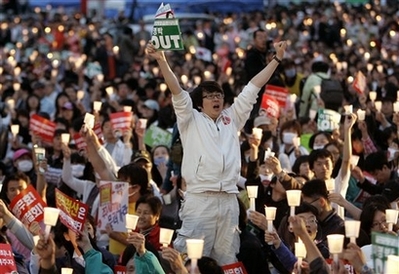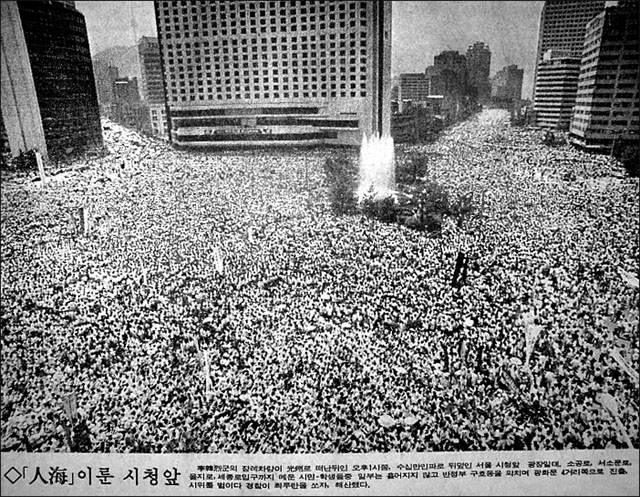Thousands begin protest over US beef amid fears of violent clash
Yonhap 2008/06/05
Thousands begin protest over U.S. beef amid fears of violent clash
By Sam Kim

(Ahn Young-joon)
SEOUL, June 5 (Yonhap) — Thousands of people on Thursday gathered in downtown Seoul to begin what they said will be a 72-hour protest over the three-day holiday weekend against the government’s recent agreement with Washington to resume U.S. beef imports, including parts known to have a high risk of carrying mad cow disease.
There were no immediate signs of violence, but the rally comes after a series of recent clashes between the protesters and riot police.
The police have promised not to use any kind of excessive force against the protesters after their use of water canons and fire extinguishers to disperse crowds at recent rallies caused an even larger uproar.
Still, there were concerns of violent clashes over the weekend, as police are expected to face tens of thousands of protesters, who in recent rallies tried to march to the presidential office.
An attempt earlier this week by the demonstrators to approach the presidential office was successfully blocked, but nearly 100 people, including some 40 riot police, were injured in the late-night clash.
Rally organizers claimed as many as 1 million people could turn out nationwide for a scheduled rally on Tuesday, when the country marks the anniversary of a 1987 democratic uprising that led the then military regime to grant free elections, prompting ensuing political reforms.
President Lee Myung-bak, a conservative who won the December election in a landslide, is accused of hurriedly pushing for the beef pact with Washington to add luster to his summit with U.S. President George W. Bush at Camp David, which was held right after the deal was reached.
The protests, which began last month as peaceful candlelight vigils against the April 18 deal between Seoul and Washington, have turned into an almost daily political campaign challenging many of the major pledges by Lee who took office just over 100 days ago.
Opponents say the deal allows parts — including bones and sections of intestines — that pose the greatest risk of transmitting mad cow disease to be imported, and that beef from cattle over the age of 30 months exacerbates the threat.
In an apparent move to quell public anxiety, the South Korean government announced this week that it has asked the U.S. to refrain from exporting meat from cattle over 30 months old.
Most cases of mad cow disease, a rare malady associated with sponge-like degeneration of the brain, have been found in cows over that age.
"We’re expecting the biggest number of protesters over the next five days," a National Police Agency official said by phone, declining to be named.
The official added that police expect about 100,000 to appear on Tuesday — less than the one million claimed by rally organizers — but still the biggest gathering on a single day since the protests began early last month.

Last weekend, a total of 60,000 protesters staged candlelight vigils in Seoul that later turned into midnight street rallies near the presidential office complex.
Hundreds of demonstrators were arrested while marching toward the presidential office on Tuesday, although they were freed hours later, when Lee publicly acknowledged fears of mad cow disease in cattle over 30 months old.
The rally comes one day after the ruling Grand National Party suffered a crushing defeat in local by-elections, in which the party won only 10 out of 52 government posts up for grabs.
The defeat, which was largely predicted by a string of media polls putting Lee’s approval ratings in the low 20-percent range, was further highlighted as a coalition of opposition parties vowed on Wednesday to boycott the opening of the legislature, whose new term began several days ago.
Opposition parties, including the liberal United Democratic Party, say they will stay away from parliament unless the government moves to rework its beef deal with Washington.
South Korea has repeatedly delayed its official resumption of U.S. beef imports amid escalating public concerns. But it has openly dismissed requests to renegotiate the agreement.
The U.S. has yet to formally respond to South Korea’s request not to export beef from cattle over 30 months old. South Korea’s Agriculture Minister Chung Woon-chun said Wednesday that proposals by U.S. exporters to voluntarily limit shipments of beef from older animals can also be seen as a "response."
Seoul halted U.S. beef imports in 2003 after Washington confirmed its first case of mad cow disease. It reopened the market last year but closed it again in October after U.S. exporters violated regulations on shipments of bone-in beef products.





